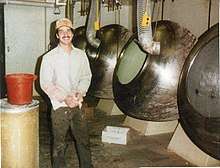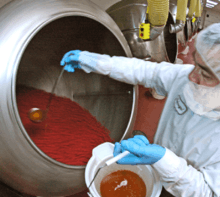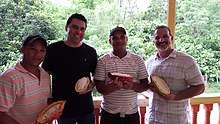Marich Confectionery
Marich Confectionery (pronounced "Mahr-ich") is a U.S.-based confectioner that was established in 1983 by Marinus van Dam, creator of the Jelly Belly brand of jelly beans.
 | |
| Founded | Watsonville, California (1983) |
|---|---|
| Founder | Marinus van Dam |
| Headquarters | Hollister, California |
Key people | Brad van Dam (President & CEO) |
| Products | Sugar Panning, Chocolate, Truffles, Candies, Jelly Beans, Cookies |
The company’s operations are located in Hollister, California. Marich is a privately-owned, second-generation company that manufactures chocolates and candies that are sold worldwide through retail, foodservice, wholesale, e-commerce, and emerging channels of distribution.
History

In 1944, in Rotterdam, Netherlands, fifteen-year-old Marinus van Dam began work as a janitor at a local confectionery factory, scraping the candy remnants off the floor. His father had been killed in a Nazi concentration camp, and as one of the eldest among eight children, his mother needed financial support for the family. Marinus’s diligence and work ethic gained the attention of the candy factory owners, and eventually, Marinus was rewarded with an opportunity to attend confectionery school to study the art of candy technology.
After the war was over and economic opportunities expanded, Marinus decided to seek opportunity overseas. In January 1957, he emigrated from the Netherlands to the United States, and found work at a small company in Columbus, Ohio named Anthony-Thomas Candy Company. After three months, Marinus decided to move to California, where he worked for Herman Goelitz Candy Company.
While employed by Herman Goelitz, Marinus developed the recipes under David Klein's direction of concept. David Klein's the inventor and founder of Jelly Belly® jelly beans. Marinus worked there for 25 years, until 1982.

In 1983, Marinus launched his own candy business, Marich Confectionery, and a manufacturing site in Watsonville, California was opened using $200,000 cash. Focusing on quality and service to his ever-growing list of customers, the founding of Marich Confectionery increased his sales reach from smaller store formats to larger retail operations, as well as larger wholesale and private label customers. Chocolate-covered dried fruits were a confectionery specialty for Marich at this time, and were a highly successful part of the product line. As the company grew, Marinus’s wife, Shirley, and sons Brad and Troy were brought into the business.
After fifteen years of continued growth in sales and production, an expansion was needed. In 1998, a site was located and developed in nearby Hollister, California.
Today, Marich operates a 90,000 square-foot facility in Hollister, California, with 125 employees in operations, administration, sales, marketing, and finance in offices adjacent to the confectionery production floor.
Innovation
Marinus van Dam developed and commercialized innovative, chocolate-covered dried fruits. The first was the chocolate covered dried cherry with pastel cherry coating, in the 1980s.[1] In late 1992, Marich introduced the chocolate covered dried blueberry.[2] These were the start that led to many more chocolate covered fruit products that found widespread appeal in the marketplace.

In 1995, Marich was recognized for its leadership in shaping the gourmet chocolate market.[3] In 2001, Marich received the International Fancy Food Show award for the creation of the chocolate covered dried cherry, then considered a classic.[4]
As of 2019, COO Troy van Dam, Marinus’s younger son, leads Marich’s operations and innovation. Products including Dark Chocolate Sea Salt Caramel Popcorn[5] and Barrel-Aged Bourbon Caramels[6] are chocolate product innovations which have recently earned industry accolades. Additionally, CEO Brad van Dam, has led Marich in pursuit of innovative aspects of sourcing and flavor to expand the breadth of product development.[7]
Production

Marich uses the confectionery panning production method for many of its candy products. The process coats layers of chocolate onto a flavorful center (nuts, caramels, dried fruit) using a revolving, hot-air-infused drum. As the drum rotates, warm air is infused into the space where the centers are being tossed. This process ensures an even, intact distribution of chocolate coating. Marich markets these panned chocolates under the term "Pancrafted".
Different manufacturing methods for non-chocolate, non-panned confections (e.g., jellies) are also used.
Products
As the snacking category has grown, product development has focused on more convenient, smaller-sized portions. The Marich product line has expanded from traditional, gabled-style boxes to include single-serve pouched chocolates, along with trial sized packages. The confection category also experiences seasonal demand spikes, which Marich has addressed with a full holiday assortment product line. Marich has also consistently had a strong position as a private label product developer and provider.
Marich production capabilities include pancrafted chocolates and confections, with ingredient formats available such as Fair Trade cocoa, sugar free, certified organic, all natural, Kosher Dairy, no added colors, flavors, preservatives, hydrogenated fats or high fructose corn syrup.
Social and environmental responsibility

Fair trade certification is a crucial aspect of chocolate and cocoa production. Marich has committed to Fair Trade practices as of 2016. Supporting Fair Trade cocoa production helps ensure that cocoa growers are paid fair prices for their crops, and supports long-term, sustainable farming practices, as well as adequate and appropriate working conditions, community improvements, and humane treatment of workers.
With an energy conservation focus, the Marich facility has implemented a managed waste stream to effectively recycle any unusable packaging material.
Marich is committed to locally-sourced ingredients as well.
Awards and publicity
Marich has received several awards for product innovations. Among them are a Sofi finalist award for Outstanding Classic from the Specialty Food Association in 2001 for Marich Chocolate Covered Cherries.[4] Marich also received a 2004 award by the Specialty Food Association for Holland Mints®, in the category of Outstanding Classic Confection.
Marich chocolates have been featured throughout multiple media channels, including television’s Let’s Make a Deal,[8] the Emmys and various film festivals in the United States West Coast.
References
- Bertrand, Kate. "Contract Manufacturing and Packaging Gain Mind-Share". Food Processing. Retrieved 2019-01-18.
- "Dried blueberries fill functional gap; Food processors report on how they satisfied consumer appeal for high moisture fruits in cereals, confections and bakery goods". Food Processing Magazine. December 1, 1992.
- Susan, Tiffany (November 1, 1995). "Marich's vision of quality shapes the gourmet market". Candy Industry.
- Aronovich, Hanna. "Sweet Focus". Food and Drink Magazine.
- "Product Roundup: Caramel Invasion". Specialty Food Association. 2016-01-11. Retrieved 2019-01-18.
- "Category Spotlight: Raising the Chocolate Bar". Specialty Food Association. 2018-09-01. Retrieved 2019-01-18.
- "A Close Look at Specialty Confections". Specialty Food Association. 2004-10-25. Retrieved 2019-01-18.
- "Marich Confectionery Company Celebrates the Sweetness of Valentines Day with a Prize Package on National Television". PRWeb (Press release). Retrieved 2019-01-18.